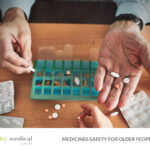Water is one of the most crucial elements for life, playing an indispensable role in keeping our bodies healthy and functioning properly. Despite its importance, many of us do not drink enough water each day, leading to a range of health issues. In this article, we will explore why staying hydrated is vital, how much water you should aim to drink daily, the signs of dehydration, and practical tips to help you stay hydrated.
The Importance of Water for Your Body
Water is often referred to as the “elixir of life,” and for good reason. Our bodies are composed of about 70% water, which is involved in nearly every bodily function. From aiding digestion to regulating body temperature, water is essential for maintaining health.
The Role of Water in Bodily Functions
Water supports numerous bodily functions, making it a vital nutrient:
- Regulating Body Temperature: Water helps maintain a stable body temperature through processes like sweating and respiration. This is particularly important in Australia’s warm climate, where dehydration can easily occur.
- Aiding Digestion: Water is necessary for the digestion and absorption of nutrients. It helps break down food so that your body can absorb the nutrients it needs. Without enough water, your digestive system cannot function properly, leading to issues like constipation.
- Transporting Nutrients and Oxygen: Water acts as a carrier, delivering nutrients and oxygen to cells throughout the body. It also helps remove waste products, ensuring that your body stays clean and healthy.
- Lubricating Joints and Tissues: Water is essential for keeping your joints, eyes, mouth, and other tissues well-lubricated. This lubrication helps prevent joint pain and keeps your body functioning smoothly.
- Maintaining Skin Health: Adequate hydration is key to healthy skin. Water helps to keep your skin moisturised and elastic, which can prevent dryness and irritation.
How Much Water Should You Drink Daily?
The amount of water you need can vary depending on several factors, including your age, weight, activity level, and the climate you live in. However, a general guideline is to drink about 2-3 litres (8-10 cups) of water each day. This amount can come from both drinks and food, as many foods contain water—think fruits and vegetables like cucumbers, watermelon, and oranges.
Adjusting Your Water Intake
Certain situations require you to adjust your water intake:
- Physical Activity: If you are exercising or doing strenuous activities, you will need to drink more water to replace the fluids lost through sweat. Make it a habit to hydrate before, during, and after your workout.
- Hot Weather: In hot climates, such as much of Australia, you need more water to keep your body cool and prevent dehydration. Always carry a water bottle with you on hot days.
- Health Conditions: Some health conditions, like kidney stones or urinary tract infections, require increased water intake. If you are unsure how much water you should drink due to a health condition, consult your GP.
Recognising the Signs of Dehydration
Dehydration occurs when you lose more water than you take in, and your body does not have enough water to carry out its normal functions. It is important to recognise the early signs of dehydration so you can take action before it becomes severe.
Common Signs of Dehydration
- Thirst: The most obvious sign is feeling thirsty. However, do not wait until you are thirsty to drink water—by the time you feel thirsty, you are already mildly dehydrated.
- Dry Mouth and Skin: Dehydration can cause your mouth and skin to become dry. You might notice that your lips are chapped or that your skin feels less elastic.
- Dark-Coloured Urine: One of the easiest ways to check your hydration level is by looking at the colour of your urine. Dark yellow or amber-coloured urine can be a sign that you need to drink more water. Ideally, your urine should be light yellow or pale.
- Fatigue and Dizziness: When you are dehydrated, your blood volume decreases, leading to a drop in blood pressure. This can cause you to feel lightheaded, dizzy, or unusually tired.
- Headaches: Dehydration can cause headaches or migraines, as the brain can temporarily shrink from fluid loss, pulling away from the skull and triggering pain.
- Decreased Urine Output: If you are not urinating as often as usual or only passing small amounts of urine, it is a sign that your body is conserving water due to dehydration.
Tips to Stay Hydrated
Staying hydrated does not have to be difficult. With a few simple strategies, you can ensure that you are getting enough water throughout the day.
Make Water a Habit
- Carry a Water Bottle: Always have a water bottle with you, whether you are at work, running errands, or exercising. This makes it easy to sip water throughout the day and monitor your intake.
- Set Reminders: If you are prone to forgetting to drink water, set reminders on your phone or use an app that tracks your water intake.
- Flavour Your Water: If plain water does not appeal to you, try adding a slice of lemon, lime, or cucumber for a refreshing twist. Herbal teas or diluted fruit juices are also good options for hydration.
- Eat Water-Rich Foods: Incorporate foods with high water content into your diet, such as watermelon, cucumber, celery, and strawberries. These can contribute to your daily water intake while also providing essential nutrients.
- Drink Water Before Meals: Drinking a glass of water before meals can help with hydration and may also help you eat less, supporting weight management.
- Limit Caffeinated and Sugary Drinks: While coffee, tea, and soft drinks can contribute to your fluid intake, they can also have a diuretic effect, causing your body to lose water. Try to balance these with plenty of plain water.
Conclusion
Water is essential to keeping your body functioning at its best. From supporting digestion to maintaining healthy skin and regulating body temperature, staying hydrated is crucial for overall well-being. By understanding how much water you need, recognising the signs of dehydration, and adopting simple habits to stay hydrated, you can ensure that your body gets the water it needs to thrive. Make hydration a priority in your daily routine—your body will thank you!







